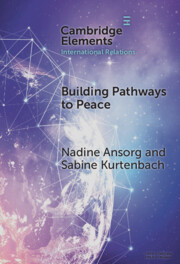22 results
Private Military and Security Companies as a Legacy of War: Lessons Learned From the Former Yugoslavia
-
- Journal:
- Business and Human Rights Journal / Volume 9 / Issue 1 / February 2024
- Published online by Cambridge University Press:
- 19 February 2024, pp. 77-102
-
- Article
-
- You have access
- Open access
- HTML
- Export citation

Building Pathways to Peace
- State–Society Relations and Security Sector Reform
-
- Published online:
- 21 November 2023
- Print publication:
- 07 December 2023
-
- Element
-
- You have access
- Open access
- HTML
- Export citation
Chapter 5 - From Peacekept to Peacekeeper
-
- Book:
- African Peacekeeping
- Published online:
- 13 January 2022
- Print publication:
- 03 February 2022, pp 164-195
-
- Chapter
- Export citation
5 - Security
- from Part II - Governance in Areas of Limited Statehood: Empirical Evidence
-
- Book:
- Effective Governance Under Anarchy
- Published online:
- 09 April 2021
- Print publication:
- 08 April 2021, pp 145-180
-
- Chapter
- Export citation

Peacekeeping, Policing, and the Rule of Law after Civil War
-
- Published online:
- 09 November 2020
- Print publication:
- 05 November 2020
1 - Introduction
-
- Book:
- Peacekeeping, Policing, and the Rule of Law after Civil War
- Published online:
- 09 November 2020
- Print publication:
- 05 November 2020, pp 1-16
-
- Chapter
- Export citation
3 - Conceptual Framework: Civil War through a Legal Lens
-
- Book:
- Peacekeeping, Policing, and the Rule of Law after Civil War
- Published online:
- 09 November 2020
- Print publication:
- 05 November 2020, pp 32-59
-
- Chapter
- Export citation
2 - History of UN Intervention and the Rule of Law after Civil War
-
- Book:
- Peacekeeping, Policing, and the Rule of Law after Civil War
- Published online:
- 09 November 2020
- Print publication:
- 05 November 2020, pp 17-31
-
- Chapter
- Export citation
4 - Theoretical Framework: Restoring the Rule of Law after Civil War
-
- Book:
- Peacekeeping, Policing, and the Rule of Law after Civil War
- Published online:
- 09 November 2020
- Print publication:
- 05 November 2020, pp 60-89
-
- Chapter
- Export citation
5 - Cross-national Evidence: UN Intervention and the Rule of Law across Africa
-
- Book:
- Peacekeeping, Policing, and the Rule of Law after Civil War
- Published online:
- 09 November 2020
- Print publication:
- 05 November 2020, pp 90-121
-
- Chapter
- Export citation
9 - Implications for Africa and beyond
-
- Book:
- Peacekeeping, Policing, and the Rule of Law after Civil War
- Published online:
- 09 November 2020
- Print publication:
- 05 November 2020, pp 219-236
-
- Chapter
- Export citation
6 - Sub-national Evidence I: The Rule of Law and Its Discontents in Liberia
-
- Book:
- Peacekeeping, Policing, and the Rule of Law after Civil War
- Published online:
- 09 November 2020
- Print publication:
- 05 November 2020, pp 122-154
-
- Chapter
- Export citation
Restoring Confidence in Post-Conflict Security Sectors: Survey Evidence from Liberia on Female Ratio Balancing Reforms
-
- Journal:
- British Journal of Political Science / Volume 49 / Issue 3 / July 2019
- Published online by Cambridge University Press:
- 28 June 2017, pp. 799-821
-
- Article
- Export citation
Exploring the military mindset: Phenomenological insights for security sector reform in Turkey
-
- Journal:
- New Perspectives on Turkey / Volume 43 / Fall 2010
- Published online by Cambridge University Press:
- 21 July 2015, pp. 97-133
-
- Article
- Export citation
Rule of Law Promotion and Security Sector Reform: Common Principles, Common Challenges
-
- Journal:
- Hague Journal on the Rule of Law / Volume 4 / Issue 1 / March 2012
- Published online by Cambridge University Press:
- 26 March 2012, pp. 158-175
- Print publication:
- March 2012
-
- Article
- Export citation
Rule of Law and Security Sector Reform: Casual Assumptions, Unintended Risks and the Need for Norms
-
- Journal:
- Hague Journal on the Rule of Law / Volume 4 / Issue 1 / March 2012
- Published online by Cambridge University Press:
- 26 March 2012, pp. 98-119
- Print publication:
- March 2012
-
- Article
- Export citation
Rule of Law Promotion and Security Sector Reform: Partners or Rivals?
-
- Journal:
- Hague Journal on the Rule of Law / Volume 4 / Issue 1 / March 2012
- Published online by Cambridge University Press:
- 26 March 2012, pp. 1-3
- Print publication:
- March 2012
-
- Article
- Export citation
Guns, Laws and Politics: The Political Foundations of Rule of Law and Security Sector Reform
-
- Journal:
- Hague Journal on the Rule of Law / Volume 4 / Issue 1 / March 2012
- Published online by Cambridge University Press:
- 26 March 2012, pp. 4-30
- Print publication:
- March 2012
-
- Article
- Export citation
Justice Reform, Security Sector Reform and Local Ownership
-
- Journal:
- Hague Journal on the Rule of Law / Volume 4 / Issue 1 / March 2012
- Published online by Cambridge University Press:
- 26 March 2012, pp. 194-209
- Print publication:
- March 2012
-
- Article
- Export citation
Rule of Law and Security Sector Reform in International State-Building: Dilemmas of Converging Agendas1
-
- Journal:
- Hague Journal on the Rule of Law / Volume 4 / Issue 1 / March 2012
- Published online by Cambridge University Press:
- 26 March 2012, pp. 31-53
- Print publication:
- March 2012
-
- Article
- Export citation

